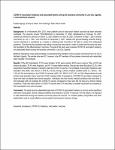| dc.description.abstract | Background: As of November 26th, 2021, three platforms and at least seven distinct vaccines had been delivered worldwide. The vaccines include: Pfizer/BioNTech on December 31, 2020; AstraZeneca on February 16, 2021; Janssen by Johnson & Johnson on March 12, 2021; Moderna on April 30, 2021; Sinopharm on May 7, 2021; Sinovac CoronaVac on July 1, 2021; and COVAXIN on November 3, 2021. Despite this ground-breaking scientific finding, vaccine reluctance is considered as a barrier to obtaining herd immunity in the fight to contain this widespread pandemic. The idea that the population was willing to accept the vaccination in order to create herd immunity has been the foundation for the effectiveness of vaccines. The goal of this study was to assess COVID-19 vaccination hesitancy and associated factors among the business community in Lira City, Uganda.
Methods: Descriptive cross-sectional design. Conducted among members of the business community from Lira City in Northern Uganda. The sample size was 421, however, only 407 members of the business community who responded were included in the analysis.
Results: Of the 407 participants, 57.3% were females, 52.5% were married, 88.4% were Langi by Tribe, 43.5% had tertiary education, 33.4% were Anglicans, and 40.1% were market vendors. Results also show that about 32.3% of the respondents had either delayed or refused to take the COVID-19 vaccine. The correlates of vaccination hesitance were education level (aOR; 3.63, 95%CI; 1.49-8.79, p=0.04), having a chronic medical condition (aOR; 2.7, 95%CI; 1.39-5.38, p=0.04) and certainty in the COVID-19 vaccines (aOR; 0.27, 95%CI; 0.017-0.51, p=0.02). Respondents who had primary level education had a more than 2-fold increased odds of acceptance of COVID-19 vaccination compared to those who had not attained any formal education. Individuals who had chronic medical conditions had more than 2-fold increased odds of accepting the COVID-19 vaccine compared to those who did not have any chronic medical conditions. Those who were certain in COVID-19 vaccine were 73% less likely to hesitate vaccination as compared to their counterparts who were uncertain.
Conclusion: The study found a substantially high level of COVID-19 vaccination hesitancy in Lira city and its predictors were level of education, chronic medical conditions and certainty in COVID-19 vaccines. For this reason, it is important to raise awareness among the business community about the vaccine. To increase uptake, policymakers and other stakeholders need to create effective communication techniques for behavior change. | en_US |

